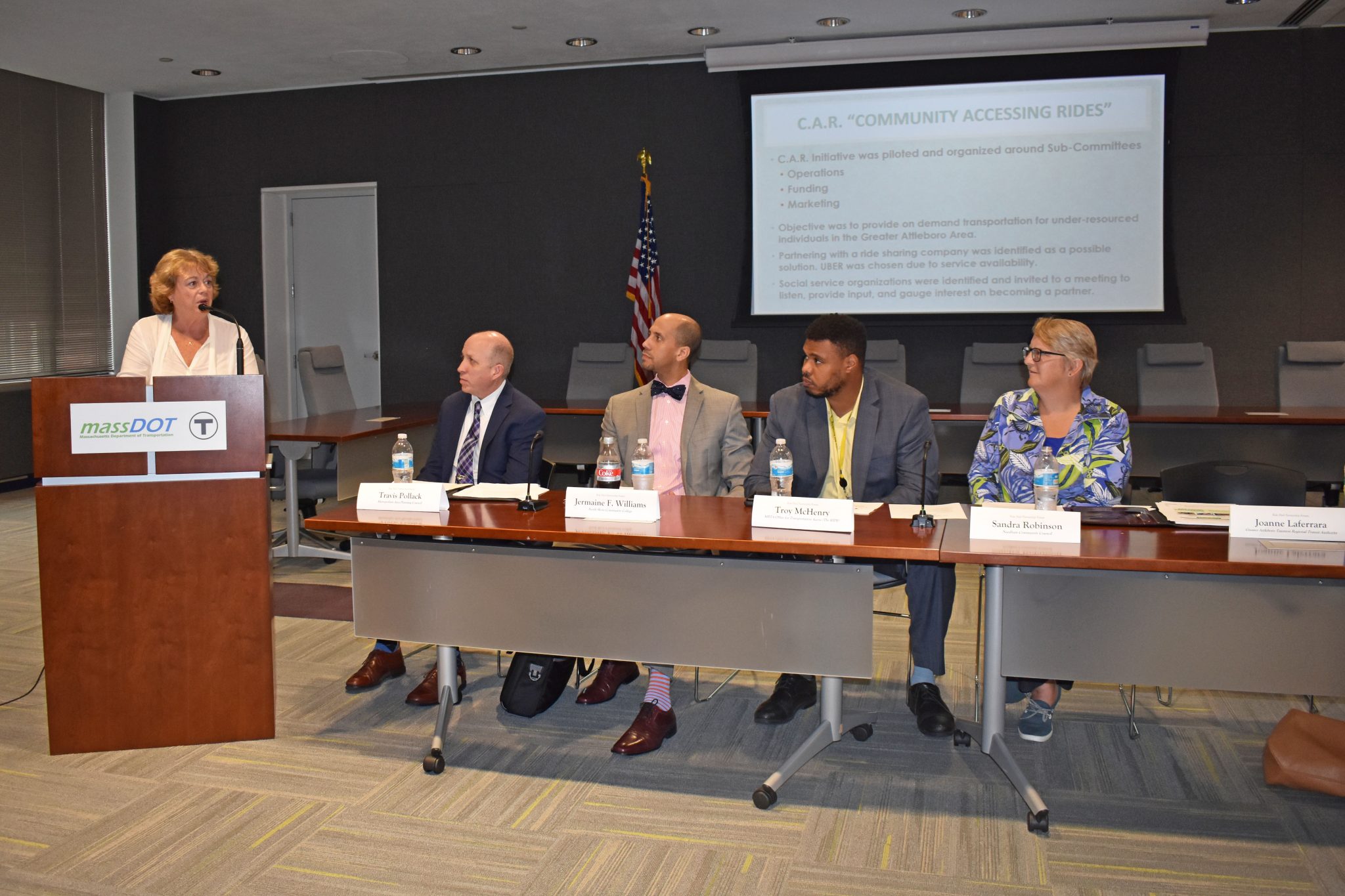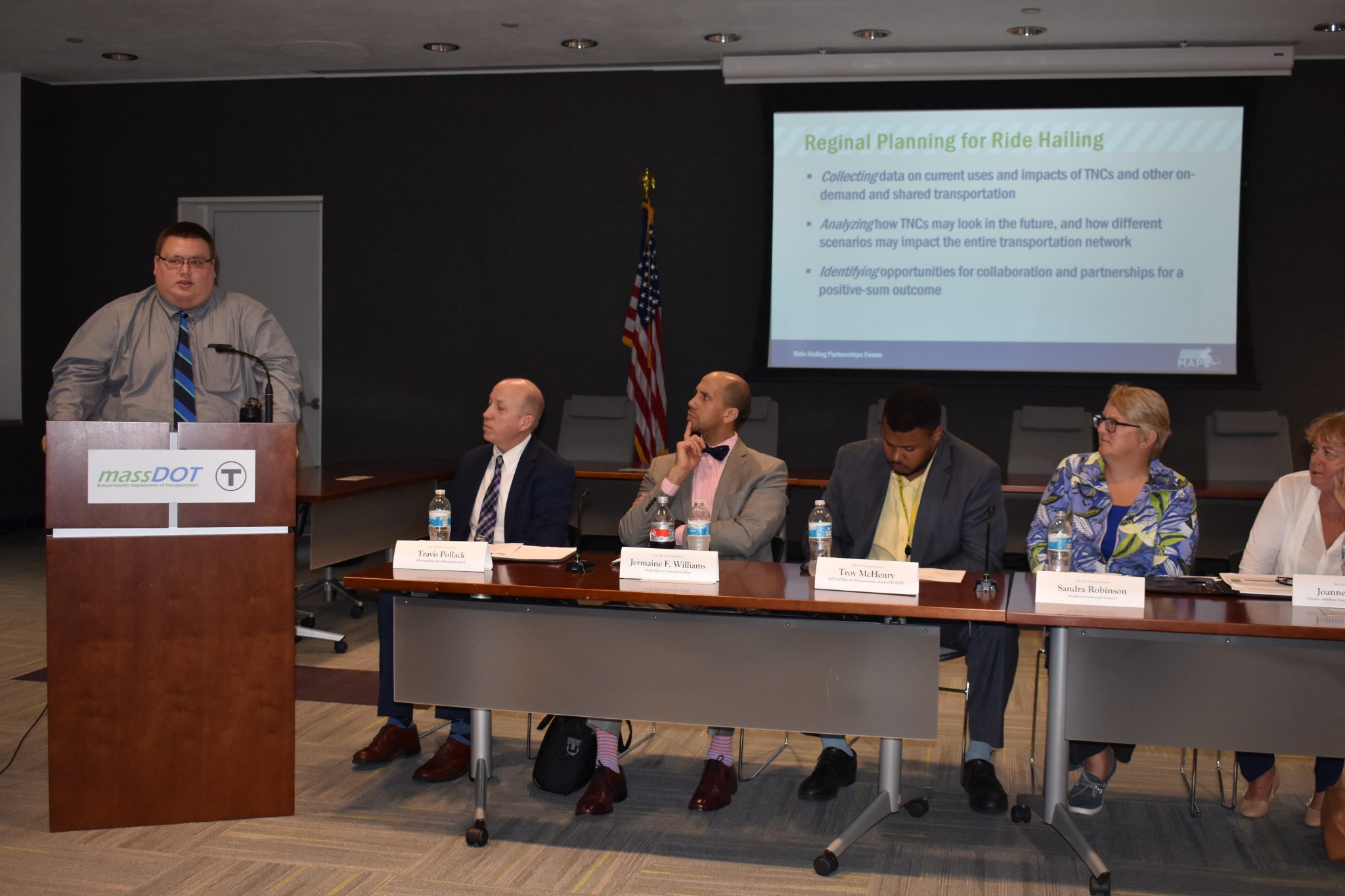Jermaine F. Williams, Troy McHenry, Sandra Robinson, Joanne Laferrara, and Sandy Johnston shared their experiences partnering with TNCs.
From replacing seldom-used campus shuttles to providing off-hours transit options to seniors or riders with disabilities, several public and private agencies have found ways to use ride-hailing to close service gaps, reduce costs, and provide connections. On Wednesday, Sept. 12, the Metropolitan Area Planning Council held a ride-hailing partnerships forum, inviting five speakers from public agencies, nonprofits, and colleges to speak about the opportunities and challenges associated with partnering with transportation-network companies (or “TNCs”) to help solve their mobility problems.
Eighty attendees gathered in the state transportation building to hear case studies and participate in a robust question and answer session with the speakers: Jermaine F. Williams of North Shore Community College, Troy McHenry of MBTA’s “The RIDE,” Sandra Robinson of Needham Community Council, Joanne Laferrara of Greater Attleboro Taunton Regional Transit Authority (GATRA), and Sandy Johnston of the Central Transportation Planning Staff (CTPS). MAPC Senior Transportation Planner Travis Pollack moderated.
See below for a rundown of the case studies discussed and to download the presentations. (And click here for a more comprehensive summary!)
Case Studies Discussed
North Shore Community College
Jermaine F. Williams, the Vice President of Student Affairs at North Shore Community College, talked about how the college has created partnerships with Uber to help students access educational opportunities.
When the college decided to discontinue an inter-campus shuttle due to low ridership and high cost, the administration wanted to continue offering transportation to campus for students who had depended on the shuttle. In September 2016, the school launched a partnership with Uber offering students discounted rides when travelling to or from NSCC Danvers from the Beverly Depot or the transportation hub at the North Shore Mall in Peabody – thereby connecting students to campus via bus and commuter rail.
MBTA Office of Transportation Access (the RIDE)
Troy McHenry, Deputy Director of Innovation and Analysis for the RIDE, discussed how the agency is developing an on-demand paratransit program through partnerships with Uber, Lyft, and taxis.
The on-demand program was designed to reduce the cost of the RIDE and to improve mobility and flexibility in what the paratransit service could offer. It supplements the traditional RIDE paratransit service. The pilot reduced per-trip costs by 58 percent from May to July compared with traditional RIDE trips, and increased total monthly trips by 46 percent. Together, the decreased costs and increased ridership made the program cost-neutral.
Needham Community Council
Sandra Robinson of the Needham Community Council presented on how the nonprofit has partnered with Lyft to provide Needham residents with transportation of “last resort” to medical appointments and other essential activities. The Council has a program offering rides to medical appointments for Needham residents, requiring riders to book in advance. When they do, Council staff first reach out to volunteer drivers, and if they can’t find a volunteer, book a Lyft for the resident. Costs are covered by the Council, but they accept donations to help cover the cost of the program.
Greater Attleboro Taunton Regional Transit Authority (GATRA)
Joanne Laferrara discussed how GATRA partners with Uber and various social service agencies to provide rides outside the transit authority’s regular service hours. In this model, social service organizations have codes that they used to call rides for people on weekends or after 6 p.m. on weekdays, when GATRA services aren’t available. As of Sept. 1, they have provided 1,168 rides, primarily for medical appointments, food access, second or third shift jobs, appointments at social service agencies, or renewal or application for government benefits.
Funding for the program comes from a variety of sources: donations from local individuals and businesses, the social service organizations themselves, a Community Transit Grant, and state legislative dollars. The Greater Attleboro YMCA acts as a fiscal agent. After October, six social service organizations will be able to sustain the costs on their own and four smaller organizations are currently working together on a sustainability plan to collaborate on funding and administration.
Understanding TNC Impacts
Sandy Johnston of the Central Transportation Planning Staff discussed the regional impacts of new ride-hailing technology and described how CTPS is thinking about ride-hailing from a regional planning perspective. He explained that it’s important to collect data on the current uses and impacts of TNCs and other on-demand and shared transportation services; analyze how TNCs may look in the future and effect the entire transportation network; and identify opportunities for collaboration and partnership.
MAPC is at the forefront of trying to understand these impacts in our region. In February, we released Fare Choices, an analysis of a survey of ride-hailing passengers in Metro Boston. In May, we built on Fare Choices with an analysis of statewide ride-hailing data released by Massachusetts regulators. The data that MAPC and other agencies are amassing help provide a better understanding of this very new and quickly-evolving transportation option.







